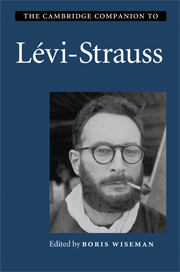12 - Before Babel: Lévi-Strauss and language
from Part III: - Language and alterity
Published online by Cambridge University Press: 28 January 2010
Summary
In the first place, we have spoken about the relation between a language and a culture. That is, how far is it necessary, when we try to study a culture, to know the language? Or how far is it necessary to understand what is meant by the population, to have some knowledge of the culture besides the language.
Lévi-Strauss, Structural AnthropologyIn a memorable passage at the beginning of Tristes Tropiques, following his famous denunciation of travel and explorers ('I hate travelling and explorers'), Lévi-Strauss criticises the amateurs of exoticism who travel vast distances in order to bring back to their European public sensationalised accounts of cultures which have already been well documented in ethnographic studies (1955a: 9-10; 1992: 17-18). Later in the text, he distinguishes between this superficial and aestheticised exoticism, which engages the senses but not the mind, and a more authentic and scientific exoticism, that of ethnography. Even if the ethnographer and the explorer might share the same passion for alterity, even if both might endure the same kind of deprivations in order to obtain their knowledge, the relative status of this knowledge is not in question (1955a: 37-8; 1992: 38-9). Although the ethnographer's point of departure is defined by his or her attraction to the 'exotic' and, symmetrically, a certain aversion to his or her native culture, the destination of ethnology as a discipline, as a science, is not exoticism for exoticism's sake, but a deeper understanding of human nature. Following the programme outlined by Rousseau in a long note of the Second Discourse, the goal of anthropology should be to acquire a better knowledge of human diversity in order to obtain a better understanding of the essence of humanity (1973a: 46; 1978b: 34-5).
- Type
- Chapter
- Information
- The Cambridge Companion to Lévi-Strauss , pp. 237 - 254Publisher: Cambridge University PressPrint publication year: 2009
- 3
- Cited by



